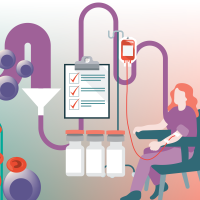Unlocking the full potential of human induced pluripotent stem cells from haplo-selected cord blood samples—the how and the why
Cell & Gene Therapy Insights 2024; 10(1), 54–64
DOI: 10.18609/cgti.2024.012
There is a critical need worldwide for tissue for transplantation in patients with organ failure and with degenerative diseases with no treatments available. Cell therapy can represent an alternative to organ transplantation and for the treatment of degenerative diseases (such as heart failure, macular degeneration, type 1 diabetes, or Parkinson’s disease, among others). The generation of human induced pluripotent stem cells offers a unique opportunity to obtain an unlimited supply of specialized cells. The use of patient’s cells for the generation of human induced pluripotent stem cells and their derivatives for treatment ensures immunological compatibility and minimizes the risk of rejection. However, the time and cost necessary to produce customized human induced pluripotent stem cell lines and their derivatives in GMP conditions are excessively high. An alternative to the use of patient-specific human induced pluripotent stem cells would be an human induced pluripotent stem cell collection from allogeneic healthy donors that could be expanded and differentiated to treat different patients. This collection should comprise lines with enough diverse and compatible homozygous human leukocyte antigen to reduce the risk of immune rejection in a high percentage of the population. Homozygous human leukocyte antigen-matched iPSC lines suitable for a wide variety of homozygous human leukocyte antigen genotypes would be valuable for significant numbers of patients and will allow delivery of off-the-shelf cells for the manufacturing of cell therapy products for multiple diseases by reducing time and costs. HAPLO-iPS aims to create a collaborative network to provide a framework for human induced pluripotent stem cell generation of human induced pluripotent stem cells homozygous for frequent homozygous human leukocyte antigen haplotypes, compatible with a significant percentage of the population to be used for cell therapy clinical trials, and to collect a data collection system for such lines and all the associated data.
